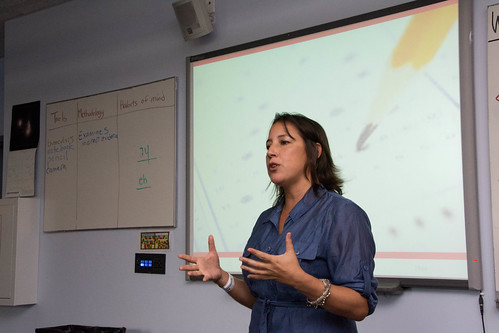 I had the pleasure of attending and presenting at EdCampNYC this year organized by some impressive and innovative educators such as my friends Deven Black, Karen Blumberg, and Ann Oro. I did a session based on a popular article I wrote recently called 20 Things Students Want the Nation to Know About Education and also incorporated elements of my talk about connecting school life to real life. In the article students tell us that they need to be seen as people, not just students. They want to feel loved. They want to feel like they belong and are a part of something. In short, they want teachers to know that mattering to them will go a long way toward fostering learning. Interestingly, several commenters to my post on my blog and in the Huffington Post railed against this idea with push back being, that a teachers job is to teach and this other stuff was someone else's job (i.e. parents, ministry, guidance counselor, etc.) The teachers who came to this session were not those teachers.
I had the pleasure of attending and presenting at EdCampNYC this year organized by some impressive and innovative educators such as my friends Deven Black, Karen Blumberg, and Ann Oro. I did a session based on a popular article I wrote recently called 20 Things Students Want the Nation to Know About Education and also incorporated elements of my talk about connecting school life to real life. In the article students tell us that they need to be seen as people, not just students. They want to feel loved. They want to feel like they belong and are a part of something. In short, they want teachers to know that mattering to them will go a long way toward fostering learning. Interestingly, several commenters to my post on my blog and in the Huffington Post railed against this idea with push back being, that a teachers job is to teach and this other stuff was someone else's job (i.e. parents, ministry, guidance counselor, etc.) The teachers who came to this session were not those teachers.In the session the focus was clear. Educators and the former principal (YAY for administrators) who attended wanted to know how we can hear the children and show them they matter, we love them, and we want to honor their unique passions, talents, interests, and abilities. We discussed a lot of great ideas. Here are five ways we discussed addressing what students want from education:
- Rather than bubbletests, measure student progress with personal success plans.
- Rather than report cards and transcripts allow students to showcase their learning with an authentic ePortfolio.
- Rather than work that only has the teacher as the audience, empower students to do real work that matters to them and has a real audience.
- Rather than telling students how to meet learning goals, empower them to drive their own learning as participant Deven Black explained he does (visit this link to see how).
- Have conversations with students about what their talents are. You can use the videos in this article that feature students sharing stories about their talents.
"What is something we can start doing today to bring this to life in each of our own environments?"One participant had a really smart idea. He said, rather than give students the feedback we feel they need, instead, ask them for the feedback they want. What a great idea! He explained that some students don't know, and for them nothing is lost. He gives feedback as he normally would. But for many students, when they are empowered to think about what feedback would be useful to them, they feel honored and respected by a teacher who values "their" learning goals.
For me, when answering Kevin's question, one person came to mind. Angela Maiers and her You Matter movement. Angela's simple suggestion is 1) To get kids talking about why they matter 2) Get teachers publicly acknowledging why their student's matter 3) Have students recognize why each of their peers matters. As Angela says, "These two little words can make a big difference." To me, this goes a long way in summing up much of what our students want from us. They want to know that we think they matter and they want us to help them figure out why.
If you want to see what it looks like when kids begin realizing that they matter, watch this video.
Thank you Angela Maiers for showing us what this looks like from the eyes of students who have started the "You Matter" conversation. How are you going to start helping your students discover how they matter where you work?
You have read this article with the title 5 ideas for responding to what kids want the nation to know about education. You can bookmark this page URL http://machining33.blogspot.com/2011/10/5-ideas-for-responding-to-what-kids.html. Thanks!



No comment for "5 ideas for responding to what kids want the nation to know about education"
Post a Comment